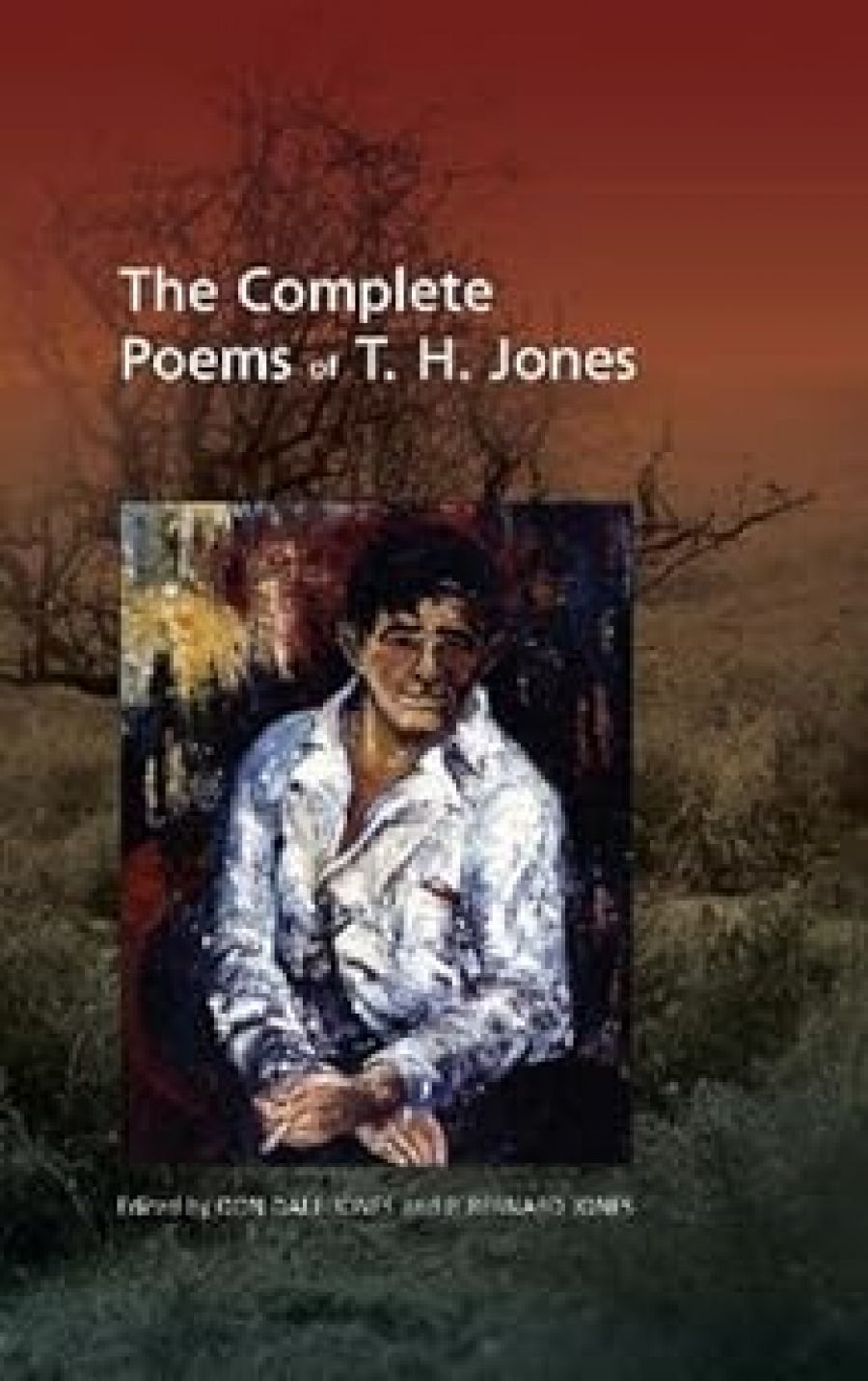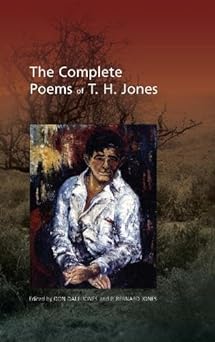
- Free Article: No
- Contents Category: Poetry
- Review Article: Yes
- Article Title: The vulture heart
- Online Only: No
- Custom Highlight Text:
In 1950 a friend presented the young Welsh poet T.H. Jones with a hand-made, leather-bound octavo notebook, the ‘Black Book’ into which he subsequently copied every completed poem he wished to preserve until shortly before his untimely death in 1965 at the age of forty-three. The Collected Poems of T. Harri Jones (1977) included a brief selection of unpublished poems from this notebook, as well as the poems from Jones’s four published volumes. Now, some thirty years later, we have a collection of all the poems from the notebook, as well as those from earlier preserved manuscripts, some only recently located. It also includes a handful of poems completed between the filling of the Black Book in 1964 and the poet’s death, and some additional poems that the poet considered ‘too “occasional” for preservation’, thus making it the first complete gathering of his large and impressive poetic oeuvre. The editors include a biographical introduction and extensive notes dating the poems, identifying first publications, and explaining literary and personal references.
- Book 1 Title: The Complete Poems of T.H. Jones
- Book 1 Biblio: University of Wales Press, £45 hb, 480 pp
- Book 1 Cover Small (400 x 600):

I first read some of these poems when they were written in the early 1960s, and they have remained with me. This scholarly edition offers a welcome opportunity to revisit those vivid, stark and hauntingly evocative poems in the light of a rich lode of some five hundred previously unknown works. These show the steady emergence of the poet’s distinctively personal voice, focused as it was on remembrance, love and existential despair. We see the young poet, already in command of a formidable technical virtuosity, experimenting with a wide range of forms and dictions. Most are spare, poignant lyrics, ranging from a few lines through sonnets and villanelles to a light-hearted verse letter in octosyllabic couplets. There are self-conscious reflections: ‘Once I wanted to make / A poem for a Poem’s sake ... A perfect poem that should be / Essence alone of poetry’, and there are accounts of the author’s response to criticism: ‘the critic must have confidence / The poet makes do with fallibility.’ The version of self described in ‘Poet’: ‘Gartered with love and gadded with ambition / Tethered to a suicidal stake’, pointedly anticipates the intense self-scrutiny of the later confessional poems.
The memories of his hard, impoverished childhood on the remote Breconshire hills of Wales inspired many of Jones’s finest poems, including the moving elegy ‘My Grandmother Died in the Early Hours of the Morning’. The intense feeling the boy developed for the Welsh landscape of his childhood did not, however, extend to the language of his ancestors. He grew up knowing only English, which was spoken in the home because his mother knew no Welsh. The loss of the ancient language of his father’s family, which he regretted as an adult, distanced him from much that he loved. Winning a scholarship to Aberystwyth University College further removed him from the bleak hills and the stifling religious certainties of his youth, though they retained their hold on his imagination:
Under God’s violent unsleeping eye
My fathers laboured for three hundred years
[…]
I inherit their long arms and mountain face,
The withering worm sleeps too within my blood
But I know loneliness, unwatched by God.
He may have escaped an unsleeping God, but the language of the Bible remained with him, as a poem for his youngest daughter reveals: ‘At least I wrote a poem when I named you / Ruth Myfanwy out of the Bible and Wales.’
The sense of loss that accompanied these separations is already evident in the early ‘Poem for Wales’. In exile from childhood and its beliefs, he furthered his escape and isolation by volunteering for the Royal Navy, spending World War II on convoy duty in the Mediterranean. The guilt he felt for surviving these ‘five / Long years of waiting to be drowned’, is captured in ‘Lucky Jonah’, his richly fashioned elegy for ‘Friends Killed on Active Service’:
And all of life a long survivor’s leave
For lucky Jonah, spewed up from the maw
To wait and wait and wait for death.
The sea’s a populous city – half my world
Is walking there, up home with mermaids,
Cold, picked clean to the white bones,
And braggarting to fish, ‘The Navy’s here.’
‘Lucky Jonah’ was itself written at sea, as Jones sailed with his family to Australia in 1959 to take up a lectureship in English at Newcastle University College. Australia offered the academic career he had long sought, and his years there saw him writing at his peak, despite increasing personal difficulties with alcohol and depression. Ironically, though he was popular with colleagues and students, esteemed as a gifted poet, and in great demand as a marvellous reader of poetry, his inner life, revealed in his bleak confessional poems, was increasingly anguished and desolate.
In ‘The Second Critical Encounter’, the poet reflects on his progress:
... I realized that this is perhaps the thing
I’ve been trying to do these ‘prentice decades,
... simply to write poems
That are good enough to be anonymous
And failing always, because on the touchlines
There has been the too obvious figure
Of the boy who once wrote a beautiful poem
And has ever since watched himself do it again.
The Beast at the Door (1963), his third and best volume, includes many poems that transcend such self-consciousness. All these poems were written in Australia, where the poet’s hiraeth, his longing for Wales, intensified. ‘The Welshman in Exile Speaks’ is a fiercely eloquent, combative monologue on the indelible legacies, good and bad, of his Welsh childhood:
Being a boy from the hills, brought up
Believing that fornication is a sin,
Adultery abomination, what should I do
But fornicate until I’m caught, and then
Commit adultery in my dreams.
[…]
Boyo, if you come from a country like that
You can talk to me of sin and related matters.
Sexual love in its diverse moods and manifestations is constantly explored. The very first poem is a ‘Sonnet on a Lost Mistress’, and while it and other early poems like ‘For a Proud Beauty’ are promising exercises rather than heartfelt laments, they presage later, more intense and accomplished poems charting the joys and sorrows of love. These range from a brief, fierce conjunction in ‘Gorse Idyll’, through ‘A Confusion of Bright Women’, to the bitter ‘Sick with Requited Love’. Tender and celebratory poems cohabit with severe reflections on the betrayals of love and bleak accounts of the woe that can accompany marriage. The abiding impression is one of a boy from the Welsh hills who never stopped believing that love and sin – ‘meaning only one thing, that thing’ – are inseparable, even though, in a world deprived of God, love is all we have.
The richly allusive ‘Girl Reading John Donne’ wittily celebrates the power of Donne’s love poetry to excite its readers. A student’s impassioned response to the poem is envisaged alongside the reflections of the middle-aged lecturer–poet who prescribed it ‘for her undoing’. The poet deftly interweaves the imprisoned tedium of ‘Mr, the almost anonymous lecturer’, with the passion of his student ignited by her reading of ‘her, his favourite Elegie’. In a final echo of Donne, the lecturer ruefully concludes that ‘elsewhere a great Prince in prison lies’.
A more despairing exploration of the gap between the young and the not so young is ‘Useless Advice to a Young Man Hopelessly in Love’:
Look greedily into her greedy eyes,
And try to tell only convincing lies.Put not your trust in words or anything.
Put not your trust is really saying enough.
Birds in the hand can’t be compelled to sing.
Despair suffices. Love’s something else ... some thing.
The bleak rhythms here reinforce the poem’s message of despair that love is elusive and wisdom incommunicable.
If love is an intoxicating but elusive companion, there is no escaping from that other demonic companion who lurks on the edges of the daylight self and haunts the nightmare territory behind it. The cruelly divided selves that recur throughout Jones’s darker poems are evident in the early ‘In the duality of man’. This might have signalled a metaphysical dialogue of self and soul, but for him it was a first articulation of the psychic division that was to torment him throughout his life. While the conflict is not yet starkly defined, and the verse is conventional, this early work prefigures many better, more personal and more anguished poems. ‘The Enemy in the Heart’, for example, Jones’s first published poem, and the title poem of his first collection (1957), describes with grim precision his irreconcilable internal conflict: ‘In the heart alone is the last enemy ... / The murderer the foul the vulture heart.’
The ultimate expression of this alien face in the mirror is ‘The Beast at the Door’, in which the poet confronts the beastly double who fuels his self-abasement and threatens his survival. The remorseless honesty of this blazing confessional poem recalls Robert Lowell, whose work Jones admired and read superbly, but it has a frightening ferocity all its own.
The editors of The Complete Poems of T.H. Jones rank him with Dylan and R.S. Thomas as the leading Anglo-Welsh poets of their time, a judgement that this collection amply justifies. His connection with Australian readers might now appear less immediate, but much of his best poetry was written in and of Australia, where his anguished sense of exile from a lost, loved homeland echoed that of many early Australians. His evocations of love, despair and self-alienation are at once firmly situated in their original time and universal in their appeal. This new edition will make his work available to a later generation of readers. They will not be disappointed.


Comments powered by CComment